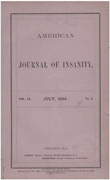Predictors of cognitive change in middle-aged and older adults with memory loss
Abstract
OBJECTIVE: Previous longitudinal studies of age-related memory loss have focused on objective neuropsychological measures that predict subsequent cognitive change, yet brain metabolic function, self- perception of memory loss, and other measures may also be sensitive indicators of cognitive change. To determine such baseline predictors of change, the authors made longitudinal assessments of middle-aged and older adults with memory loss. METHOD: Forty-two persons (mean age = 60 years, range = 43-81) with memory complaints received comprehensive baseline assessments, including subjective neuropsychological measures, objective measures of visual-spatial memory (the Benton Visual Retention Test) and verbal memory (the Buschke-Fuld Selective Reminding Test), and positron emission tomography scans to determine neocortical glucose metabolism. At an average follow-up of 3 years, the objective neuropsychological measures were again used to quantify the degree of cognitive change. RESULTS: Multiple regression analyses indicated that parietal asymmetry, sex of the subject, and baseline visual-spatial memory score were significant predictors of change in visual-spatial memory; level of education and baseline verbal memory score predicted change in verbal memory. Other neocortical asymmetry scores, age, family history of Alzheimer's disease, cerebral atrophy, and self- ratings of use of mnemonics were not significant predictors of change. CONCLUSIONS: Measures of cerebral metabolism, objective memory performance, sex, and education may predict subsequent cognitive change in middle-aged and older persons with memory loss. Also, the parietal asymmetry found in persons with questionable dementia that progresses to probable Alzheimer's disease may be present very early in the course of age-related cognitive decline.
Access content
To read the fulltext, please use one of the options below to sign in or purchase access.- Personal login
- Institutional Login
- Sign in via OpenAthens
- Register for access
-
Please login/register if you wish to pair your device and check access availability.
Not a subscriber?
PsychiatryOnline subscription options offer access to the DSM-5 library, books, journals, CME, and patient resources. This all-in-one virtual library provides psychiatrists and mental health professionals with key resources for diagnosis, treatment, research, and professional development.
Need more help? PsychiatryOnline Customer Service may be reached by emailing [email protected] or by calling 800-368-5777 (in the U.S.) or 703-907-7322 (outside the U.S.).



